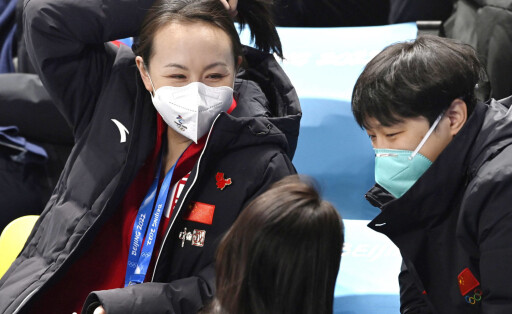Sport in China has gained importance in recent decades. The country aspires to be not only a great, but a strong sports nation. Table.Media's editorial team has all the news about sports in China.
What sports are played in China?
Sports in China enjoy a great diversity. There are many traditional Chinese sports. They range from classical martial arts (wushu) such as kungfu, taijiquan and qigong to chess. Table tennis and badminton are also very popular. A third of all Chinese who play sports do so. In recent years, running has also become an important trend. 44 percent of all Chinese who play sports count it as their main sport. With the opening of the country, basketball and soccer have also become increasingly popular in China. Soccer has been very popular in China since the 1980s. The opening of the People's Republic has also brought the most important world sport to the country. In 2013, Xi Jinping discovered sports as an instrument of geopolitics and decided to develop China into a world power. The goal was to host a FIFA World Cup, participate in one and win one. According to the five-year plan, by 2025, 50 million students in 50,000 special schools should receive soccer instruction. Forty thousand soccer fields have already been built or renovated.
How has the importance of sport in China changed in recent years?
Sports have become increasingly important in China in recent years. The Chinese Communist Party is pursuing the goal of transforming the People's Republic from a great sports country into a strong sports country. This involves not only the promotion of competitive sports, but also the expansion of popular sports. It is to promote a corresponding industry and sports culture. Since the 2008 Summer Games, August 8 has been National Fitness Day in China.
Who plays which sport in China?
Around 35 percent of all Chinese regularly participate in sports. The Communist Party's goal is to increase this percentage to 45 percent by 2035. The People's Republic has national fitness standards that 92 percent of all Chinese should then meet. Among children, sports such as fencing, ice hockey and horseback riding have become trend sports. Marathon running, along with badminton and table tennis, has become a true national sport in China. As in the rest of the world, golf is very popular among managers in China. Those who can afford it also go fishing, diving or horseback riding. Imports of the corresponding products have increased massively in recent years.
What is China's attitude to the Olympic Games?
For China, the Olympic Games are a means of geopolitics and diplomacy. For the Communist Party, success at this event is an expression of national strength and social civility. China's results at the Olympics are also of great interest to the Chinese and bearers of national pride. Gold medal winners not infrequently dedicate their success to the Communist Party. Those who lose - such as table tennis player Xu Xin, who only won the silver medal against archrival Japan, of all countries, in 2021 - must expect massive hostility.
Was China represented at the Olympic Games?
China first took part in the Olympics in 1932. After 1952, however, the People's Republic withdrew because the International Olympic Committee did not want to exclude Taiwan. After the death of Mao Zedong, a process of opening began. In 1984, China sent athletes to the Olympic Games for the first time in 32 years. In that year, sports shooter Xu Haifeng won the first gold medal for China. In 2008, China was allowed to host the Olympic Games itself and led the medal table with 48 gold medals.
What is the relationship between China and Germany in sports?
Politically, Germany is keeping a very low profile vis-à-vis China when it comes to sports. While many countries are not sending political representatives to the Winter Olympics in Beijing, for example, to draw attention to human rights violations in the People's Republic, the German government is still keeping a low profile. It does not want to risk any economic or diplomatic upheavals. German soccer clubs and the DFB are less hesitant. FC Bayern Munich already has a branch in China, cooperates with Alibaba and has also already opened three soccer schools. Borussia Dortmund also has a branch in Shanghai and works with the Communist Party to discover young players and develop them in its own academy. FC Köln, on the other hand, failed with its plans to become active in China. The club wanted to develop young players in the People's Republic, but had to end the project for lack of resources.
Which Chinese athletes do you need to know?
Perhaps the most famous Chinese athlete in the world is Yao Ming. The basketball player was active in the NBA until 2011 and at the time of his retirement was the tallest active player in the league at 2.29 meters. For several reasons, moreover, swimmer Sun Yang is known worldwide. He won six Olympic medals (three gold) and 16 medals at World Championships (eleven gold). However, he is serving a doping ban until June 2024. Liu Changchun was the first Chinese athlete to compete in the Olympic Games. In 1932, he competed for the People's Republic in the 100-meter and 200-meter races. Xu Xin is one of the most successful table tennis players in the country. He won the world title three times in doubles, twice in mixed and five times in team. Yang Chen was the first Chinese player in the German Bundesliga. Between 1998 and 2002, the striker made 94 appearances for Eintracht Frankfurt in the first and second divisions and the DFB Cup, scoring 21 goals.
News about sports in China
The Communist Party's five-year plan is to make sports more popular in China, and Xi Jinping sees sporting success as a facet of geopolitics. Accordingly, there is increased investment in this area. The Table.Media editorial team covers developments in sports in China.





